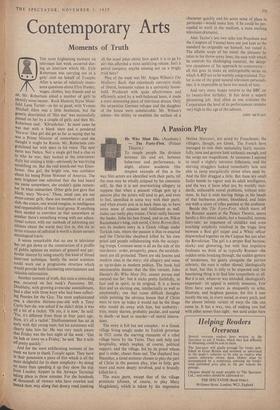Contemporary Arts
Moments of Truth
THE most frightening moment on television last week occurred dur- ing an interview which Mr. Fyfe Robertson was carrying out in a girls' club on behalf of Tonight. After a series of relatively innoc- uous questions about Elvis Presley, wages, clothes, boy-friends and so on, Mr. Robertson asked a number of girls to identify some names : Rock Hudson,-Jayne Mans- field, Lana Turnerâso far so good; with Yvonne Mitchell there was a little hesitation, but the generic description of 'film star' was successfully pinned' on her by a couple of girls; and then Mr. Robertson said : `Khrushchev.' In most cases he was met with a blank stare and a pondered No-o-o.' One girl did get as far as saying that he was a Prime Minister of somewhereâand she thought it might be Russia. Mr. Robertson con- gratulated her with tears in his voice. The next name was Nehru. Not a single girl had a clue as to who he was; they looked at the interviewer shyly but smiling a littleâobviously he was trying something on. But the real knock-out was Eisen- hower. One girl, the bright one, was confident about his being Prime Minister of America. The next brightest one admitted that she had heard the name somewhere, she couldn't quite remem- ber in what connection. Other girls just gave that blank, wary `No-o-o.' These, mind you, are not street-corner girls; these are members of a youth Club, the cream, one would imagine, in intelligence and responsibility of their local group. If anything were needed to convince us that somewhere or another there's something wrong with our educa- tional system, with our methods of informing our citizens about the world they live in, this six or seven minutes of celluloid is worth a dozen earnest sociological tracts.
It seems remarkable that no one in television has yet got down to the construction of a profile of public opinion on matters of .general and par- ticular interest by using exactly this kind of filmed interview technique. Surely the social scientists could work out a programme structure which would provide both fascinating entertainment and valuable information.
Another moment of truth, this time a rewarding one, occurred on last week's Panorama. Mr. Dimbleby, with growing avuncular astonishment, had a chat with three boys who had been collect- ing Pennies for the Guy. The most sophisticated one, a cherubic thirteen-year-old with a Tony Curtis hair-do, was asked if he didn't think it was all a bit of a racket. 'Oh yes, it is now,' he said. `Yes, it's different from three or four years ago.⢠Now, it's all a racket.' Disillusionment has set in early with this young man; but his astuteness will clearly take him far. He was very much aware that Friday was the best night of the week : 'Get six bob or more on a Friday,' he said. 'But it tails off pretty quickly.'
And for the most exhilarating moment of the Week we have to thank Tonight again. They have in their possession a piece of film which is all the more delightful for its sheer simplicityâby doing no more than speeding it up they show the trip from I ondon Airport to the Airways Terminal taking place, in three minutes. For the hundreds of thousands of viewers who have crawled and looted their .way along that dreary road (making
all the usual jokes about how quick it is to go by air) this afforded a most satisfying release. Isn't a petrol company maybe missing out on a bright trick here?
Play of the week was Mr. Angus Wilson's The Mulberry Bush, that relentlessly corrosive study of liberal, humanist values in a university house- hold. Produced with quiet effectiveness and efficiently acted by a well-balanced team, it made a most interesting piece of television drama. Only the serpentine German refugee and the daughter of the house were unbelievable. Mr. Wilson's talentsâhis ability to establish the surface of a
character quickly and his acute sense of place in particularâwould make him, if he could be per- suaded to work in the medium, a most exciting television dramatist.
Alan Taylor's last two talks (on Napoleon and the Congress of Vienna) have not just kept to the standard he originally set himself, but raised it. The affable scope of his mind; the pleasure he takes in his throw-away lines, the ease with which he controls his challenging material, the decep- tive casualness of his approach to controversyâ all this goes to make an unforgettable series on which A-RD are to be warmly congratulated. Tay- lor is one of the great natural television personali- ties; it is impossible to have too much of him.
And very many happy returns to the BBC on its twenty-first birthday. It has done a superb pioneering job. And often as one criticises the Corporation the level of its performances remains very high in this age of the admass.
































 Previous page
Previous page